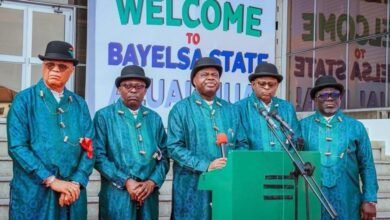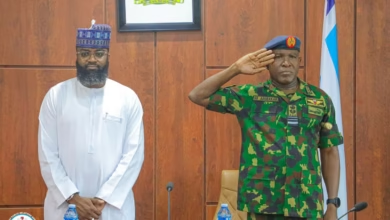
It has come to the attention of the National Institute of Social and Economic Research (NISER) the report by Sahara Reporters, an Online Tabloid, published on the 23rd of April 2018, with spurious allegations leveled against the institute and the Director General by unknown persons.
It is pertinent to state that all of the allegations in the Sahara Reporters’ publication are false and baseless, and should be disregarded by the public.
One wonders why Sahara Reporters would allow its medium to be used for such irresponsible journalism. Their reporter did not make a serious attempt at “hearing the other side” or investigating the real facts of the case before publishing unfounded allegations.
More surprising is that Sahara Reporters chose to drag the good name of Nigeria’s Vice President into this false narrative and biased reportage, simply as clickbait, and in bad taste.
In my position as Director General of the Nigerian Institute for Social and Economic Research (NISER), I am constrained to respond to these baseless charges.
As to the false allegations, these are the facts:
Unlike the baseless claims in the report, that the DG sold three 500KV electricity generators each valued at 30 million Naira for the sum of N700,000; as of today, the two working 500KV generators have not been sold and remain on the NISER premises.
In addition, the 500KV generator which was sold was purchased in 1987 (30 years old) and have not worked since 2011. The pre-auction valuation of all generators was done according to Federal Government guidelines by the Federal Ministry of Works. However, the auction price was N1.7 million not N700,000 as claimed by Sahara Reporters.
Other generators sold in the past year were sold as scrap. Three of which were purchased in 1993. One of these generators, which was donated as project equipment, was so old that no record of their dates of purchase existed. Total revenue realized from the 2018 auction of unserviceable equipment was N4.7 million and proceeds of the sale domiciled with the Federal Government.
The process of sale of these generators followed government procurement guidelines to the letter and at no time was the DG part of the procurement process. (I have deliberately recused myself from any procurement process within the institute to avoid any slight hint of favoritism or bias).
The Vice President did not and has never defended me in any case of corruption. The case in question was defended by Kola Awodein and co. Incidentally I was found innocent on all charges and discharged and acquitted by a tribunal of three serving judges. All allegations were found to have been fabricated by political opponents.
The N500,000 research fieldwork grant was not reduced to N50,000. This claim is false. After discovering incidences of abuse and data forgery, management put in place an arrangement where researchers now receive their grants in tranches. AT each point, the researcher must prove that he/she actually went out into the field to collect the data before receiving the next installment.
Researchers have not gone on international conferences only because of budgetary constraints. However, in 2018 researchers attended conferences in South Africa, Cote d’ivoire and Kenya all sponsored by the conference organizers. Furthermore, NISER has invested heavily in the retraining of research staff within NISER some of whom went on to support the Minimum wage macroeconomic modelling exercise.
No research professor has resigned his appointment in NISER (The claim in the report is a complete fabrication).
I did not refuse Sahara Reporter’s request for a discussion. I asked that the request be put in writing for record purposes and that my accusers be identified. Surprisingly, one hour 30 minutes after the reporter’s discussion with my secretary (I never did speak to them), their article was published.
Background and context
For the records, NISER was established in 1950 (not 1906) as WISER (West African Institute of Social and Economic Development). At independence in 1960, WISER became NISER relocating to the university of Ibadan and later moved to its own premises in the early seventies. Government, recognizing the critical role that NISER was mandated to play in economic development, that the institution was in a state of disrepair and for some time had suffered neglect and underinvestment, determined to reposition the agency for the benefit of the country.
In July 2017, when I assumed office, NISER an institution set on a small campus akin to a university, lacked running water, had no internet services and was receiving 4 hours of power a day from the public grid. The institution had lost its position on the global Think Tank rankings. At a point in its history, NISER ranked in the top one hundred Think tanks in the world. Presently, it is not ranked in the top 100 research institutes in Africa and is not certainly recognized in the world.
Research standards had declined and output was so low that there were only 8 publications on the website in 5 years. My mandate was to reposition the institute, restore the standards of scholarship and reestablish its lost glory.
Our story of positive change and development:
Since I assumed office as DG we have, in spite of federal government budgetary and funding constraints, put in place running water, instituted High speed broadband internet services campus wide and put a generator in the central building where the accounts, administration director of research and the DG’s offices are housed. The proposed sale of the giant generators was part of an optimization program, meant to provide funds to power the research buildings in a sustainable manner since the institute could not afford to fuel such huge generators.
Research standards have been strengthened and are now being rigorously enforced, and strict criteria for promotion reestablished. Government has provided initial funding for the physical renovation of the campus to begin. This process is being conducted is strict adherence to federal government procurement guidelines.
It is clear that any process of change this ambitious is bound to have detractors. Those members of staff of the institute who were invested in the status quo will be aggrieved by the disruptions and will fight back.
The label that I am “Osinbajo’s man”, meant to disparage me, is one that I wear with great pride. It is a privilege and indeed an honour to serve under an administration that is led by a President and Vice President who stand for rectitude, integrity and vision and remain committed to making Nigeria better.
Dr. Folarin Gbadebo-Smith
Director General
Nigerian Institute for Social and Economic Research




